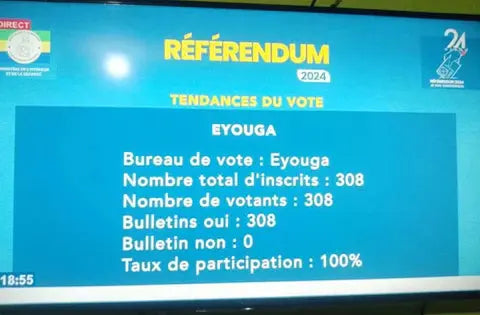
The Bible of Anomalies: In-depth Analysis of Dysfunctions during the Gabonese Referendum and Questioning the Role of Observers
The 2024 referendum elections in Gabon have sparked intense controversy, particularly due to the numerous anomalies noted during the process. This dossier aims to list and analyze these irregularities in order to provide an overview of the dysfunctions observed, while assessing their impact on the credibility of the vote.
Consult the document from the Gabonese Ministry of the Interior
1. Management of Electoral Lists
Inconsistencies in Electoral Lists
Many voters reported not finding their names on the electoral rolls, despite being registered. Citizens, despite having their voter cards, were sent away without being able to vote. This raises questions about the integrity of the electoral register.
Last Minute Polling Station Change
The Interior Minister allowed voters to choose between two specific polling stations, which created confusion and suspicions of manipulation. This unforeseen flexibility opened the way to risks of double voting or poor coordination of transfers.
2. Organization on Voting Day
Late Opening of Offices
Some centres opened several hours late due to a lack of electoral materials or the absence of polling agents. For example, in Estuaire province, voters waited until noon before being able to vote.
Lack of Material
There were insufficient ballot papers in some polling stations, forcing voters to wait several hours for additional materials to be delivered. In Lambaréné, voters experienced this frustrating situation, compromising the effectiveness of the poll.
Absent or Partial Supervision
Opposition representatives were not allowed to enter some offices, despite having accreditations. The lack of opposition oversight contributed to suspicions of irregularities.
3. Pressure and Intimidation
Military Presence Around the Offices
Reports indicate a strong military presence in urban areas, creating a climate of fear. In some neighborhoods of Libreville, soldiers controlled the entrances to polling stations, dissuading some voters from voting.
Pressure on Voters
Some citizens reported being "encouraged" to vote in favor of the new constitution by municipal officials, raising questions about undue influence in the electoral process.
4. Transparency of the Count
Absence of Independent Observers
International NGOs were not invited to monitor the vote, limiting transparency. The European Union and other organizations that usually monitor elections were absent, casting doubt on the validity of the process.
Inconsistent Results
The announced turnout (53.5%) is contested by members of the opposition who believe that it does not exceed 30%. In addition, the massive gap in favor of the "YES" (91%) is perceived as suspect, particularly in areas historically favorable to the opposition.
Examples of Wrong Calculations
-
Ntchengué Polling Station : The number of registered voters was 300, with a total of 200 declared voters. However, the votes cast were 230, with 210 for "YES" and 20 for "NO". This inconsistency suggests that ballots were added irregularly.
-
Awoungou Voting Center : The number of registered voters announced was 500, but the votes cast exceeded this number with a total of 550 votes counted, or 120% participation. Such an anomaly is mathematically impossible and indicates potential fraud.
-
Malinga Polling Station : There was a 100% turnout, with 100% of the vote in favour of the "YES" vote. However, local reports mentioned voters who were unable to vote because their names could not be found on the lists, making these results highly unlikely.
-
Marien Ngouabi Center Office 5 : The number of voters declared was 201, but the published results indicated 235 ballots cast (201 for "YES" and 34 for "NO"). The number of ballots cast exceeds the number of voters, which constitutes an obvious counting error.
5. Communication and Publication of Results
Delay in the Announcement of Results
The first results were slow to be communicated, fueling rumors of manipulation. This lack of rapid communication has raised questions about the integrity of the counting process.
Conflicting Data
In some polling stations, the figures reported by local observers did not match the official results. For example, in Port-Gentil, a polling station reported a result that differed from the figures announced by the government.
Lack of Digital Transparency
The official website of the Electoral Commission did not publish the results by polling station, preventing any independent verification. This opacity contributed to increasing suspicion about the final results.
📣 𝐁𝐨𝐧 𝐀̀ 𝐒𝐚𝐯𝐨𝐢𝐫 𝐬𝐩𝐞́𝐜𝐢𝐚𝐥 𝐑𝐞́𝐟𝐞́𝐫𝐞𝐧𝐝𝐮𝐦 | 𝟕𝟏 % 𝐝𝐞 𝐭𝐚𝐮𝐱 𝐝𝐞 𝐩𝐚𝐫𝐭𝐢𝐜𝐢𝐩𝐚𝐭𝐢𝐨𝐧 𝐚̀ 𝟏𝟕𝐡. pic.twitter.com/W208Cxw1gR
— Gabon24 (@tvgabon24) November 16, 2024
6. Suspicion of Organized Fraud
Appearance of Additional Votes
Absentee and deceased voters are said to have been among those who cast ballots. Several families have reported that deceased relatives "voted," suggesting that the lists were manipulated.
Multiple Votes
Witnesses reported seeing people vote multiple times at different polling stations. These allegations of multiple votes undermine the credibility of the results and the legitimacy of the election.
7. Unlikely Results
100% Participation Rate
In many national polling stations, turnout rates of 100% were declared, which is statistically impossible, especially since some stations had reported problems finding names on lists. These abnormally high rates indicate possible falsification of the data.

Uniform Results for "YES"
In some polling stations, the "YES" vote won 100% of the vote, which is also suspicious, especially in areas where the opposition has historically been well established. This suggests that the results were manipulated to avoid any challenge.
Examples of Unlikely Outcomes
-
Polling Station in Ekouma : All registered voters voted, and all voted "YES", with no blank or invalid ballots. This is highly unlikely, even under ideal conditions.
-
China Offices (Beijing, Shanghai, Wuhan) : Participation rates exceeded 97%, with a 100% “YES” vote. These results contrast sharply with the more diverse rates observed in other international offices, such as those in the United States and France.
-
Ondili Polling Station : A 100% turnout was reported with 100% voting for "YES". Reports of voters being turned away due to their names not being on the lists make these results even more doubtful.

"Screenshot taken from the official document of the 2024 referendum: this table shows a blatant error where the total of votes for 'Yes' (201) and 'No' (35) reaches 236, thus exceeding the number of voters announced (201)."
8. Contextual Observations
Overall Participation Rate Revised Downwards
The turnout was initially announced at 71% at midday, but was later revised to 53%. This unexpected drop has not been convincingly explained, raising questions about the reliability of the figures reported by the government.
Number of Observers Announced Different
The number of observers announced by the government differs from that mentioned in available reports. There are rumours that some observers were expelled from some polling stations, further limiting the transparency of the vote.
These anomalies reveal an electoral process marked by systemic dysfunctions, a lack of transparency, and suspicions of organized fraud. The accumulation of these irregularities casts a shadow over the credibility of the results and raises questions about the legitimacy of the new constitution adopted by this referendum.
To strengthen transparency and restore public confidence, it is essential that independent investigations are conducted into all of these anomalies, and that the lessons learned are used to improve the conduct of future elections in Gabon.
9. Observers Observed: Their Responsibility in the Face of Anomalies
Observers Under Surveillance
International observers, who are supposed to guarantee the transparency of the vote, find themselves under critical scrutiny. Their role and responsibility in validating the results are now being questioned, particularly in the face of the flagrant anomalies observed. Will they react? Are they corrupt? Is this interference? How can they accept being associated with what is perceived by many as an electoral farce?
Focus on Each Observer
-
European Union (EU) : Led by officially accredited representatives, the EU mission is criticized for its closeness to the Gabonese authorities. Their apparent silence in the face of irregularities raises questions about their impartiality and credibility. Can the EU afford to endorse such a contested process without harming its image as a guarantor of democratic values?
-
United States : The United States observed the vote through its embassy but avoided any public criticism of the anomalies noted. Its neutrality is questionable, especially if its silence is interpreted as tacit approval of a flawed process.
-
Commonwealth : Known for promoting democratic values, the Commonwealth has also remained silent on electoral irregularities. This lack of response could be seen as a tolerance of dysfunction, undermining their role as guarantor of democratic standards.
-
African Union (AU) : Often seen as less critical than Western observers, the AU oversaw the polls without denouncing the irregularities. Their final report will be crucial in determining whether they choose to acknowledge these irregularities or ignore them.
-
Citizen Observer Network (ROC) : Composed of several Gabonese civil society organizations, the ROC is funded by foreign partners, which raises the question of their real independence. Their observations will be decisive in assessing the transparency of the vote, but their silence so far is worrying.
Acceptance or Condemnation?
Will observers finally criticize the conduct of the vote? Their role is essential to ensure the legitimacy of the elections, but the passivity observed so far casts doubt on their willingness to expose anomalies. If they choose to remain silent, they risk being associated with an electoral charade, compromising their own credibility and public confidence in the electoral processes in Gabon.
It is imperative that observers, both international and national, take responsibility and publish honest and transparent reports on the conduct of the referendum. Their ability to expose irregularities will determine not only the credibility of the vote, but also their future role as guarantors of democratic processes in the region.





